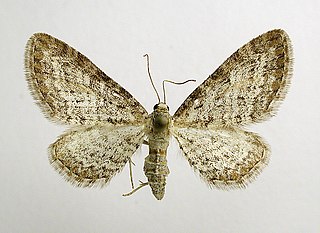
Eupithecia is a large genus of moths of the family Geometridae. There are hundreds of described species, found in all parts of the world, and new species are discovered on a regular basis.

The common pug(Eupithecia vulgata) is a moth of the family Geometridae. It is a common species across the Palearctic region, the Near East and North Africa. It ranges from the Atlantic coast of Ireland and Portugal across Europe, the Middle East and Central Asia to the Russian Far East (Priamurje) and Korea.

The tawny speckled pug(Eupithecia icterata) is a moth of the family Geometridae. It is found throughout the Palearctic region, the Near East and North Africa.

The juniper pug or juniper looper(Eupithecia pusillata) is a moth of the family Geometridae. It is found throughout the Palearctic and Nearctic regions and the Near East.

Eupithecia simpliciata, the plain pug, is a moth of the family Geometridae. It is found in the Palearctic ecozone, from western Europe to north-western China (Xinjiang).

Eupithecia venosata, the netted pug, is a moth of the family Geometridae. It was first described by Johan Christian Fabricius in 1787. It is found across the Palearctic ecozone from Portugal and Morocco in the west to the Lake Baikal in Siberia and Afghanistan and Pakistan in the east.

Eupithecia subumbrata, the shaded pug, is a moth of the family Geometridae. The species was first described by Michael Denis and Ignaz Schiffermüller in 1775. It is found from Mongolia and the Altai Mountains through Siberia, central Asia, Asia Minor and Russia to western Europe and from central Scandinavia to the Mediterranean region.

Eupithecia breviculata is a moth of the family Geometridae. It is found in the Mediterranean region, Switzerland, Hungary, the Near East and North Africa. It is also found in Iran and Turkmenistan.

Eupithecia distinctaria, the thyme pug, is a moth of the family Geometridae. It is found throughout Europe. It is also found in Iran.
Eupithecia tricrossa is a moth in the family Geometridae. It is found in the southern Himalaya, from Nepal to Tibet, Sikkim, Bhutan, north-eastern India and northern Myanmar.
Eupithecia robiginascens is a moth in the family Geometridae. It is found from the southern and western Himalaya to southern China and northern Myanmar.
Eupithecia variostrigata is a moth in the family Geometridae. It is widespread in the western Palaearctic, ranging from Spain to the western Pamirs in the east.

Eupithecia silenicolata is a moth in the family Geometridae. It is found from southern Europe and Morocco to western Asia, Iran and Pakistan. In the north, the range extends to southern Switzerland, Austria and northern Italy.
Eupithecia undata is a moth in the family Geometridae first described by Christian Friedrich Freyer in 1840. The North American Moth Photographers Group lists it as a synonym of Eupithecia lafontaineata. It is found in the Pyrenees, Alps, the Massif Central, the Tatra mountains, on the Balkan Peninsula and in Romania. It is also found in North America, where it has been recorded from Wyoming, Montana, Idaho, Colorado, Nevada and Oregon.

Eupithecia ericeata is a moth in the family Geometridae first described by Jules Pierre Rambur in 1833. It is found in most of southern Europe and the Near East.
Eupithecia inoueata is a moth in the family Geometridae. It is found in Nepal, north-eastern India and Bhutan.
Eupithecia pinkeri is a moth in the family Geometridae. It is found in Anatolia and Transcaucasia.
Eupithecia leamariae is a moth in the family Geometridae. It is found in Bhutan.
Eupithecia falkenbergi is a moth in the family Geometridae. It is found in Bhutan.
Eupithecia hollowayi is a moth in the family Geometridae. It is found on Borneo.












